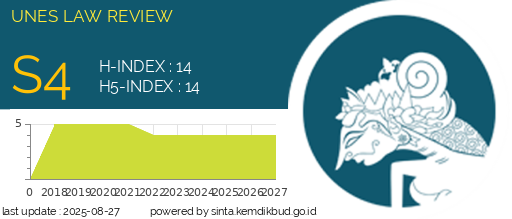Penyidikan oleh Kejaksaan Terhadap Tindak Pidana Korupsi yang Dilakukan Aparat Penegak Hukum
DOI:
https://doi.org/10.31933/unesrev.v6i1.887Keywords:
Authority, Investigation, Corruption CrimeAbstract
Based on Article 11 paragraph 1 of the Corruption Eradication Commission Law, the investigation process for criminal acts of corruption falls under the authority of the KPK. However, most of these investigations are carried out by the police or prosecutors. So whether prosecutor investigators have the authority to investigate corruption crimes against law enforcement officials is reviewed based on the Prosecutor's Law in conjunction with the Corruption Eradication Commission Law. As well as what are the legal consequences of investigations conducted by prosecutor investigators against law enforcement officials who commit acts of corruption in terms of the Corruption Eradication Commission Law. The results of this study can be concluded first, that the prosecutor's office has the authority to investigate criminal acts of corruption committed by law enforcement officials. However, based on the principle of lex specialis derogat legi generalis, it is the KPK that is in charge. Second, based on the provisions of the KPK Law, the KPK can take over the investigation process. This takeover attempt was not carried out by the KPK so that the KPK violated the code of ethics because it did not carry out its duties and authorities properly.
Downloads
References
Hiariej, Eddy OS. 2009. Presepsi dan Penerapan Asas Lex Specialis Derogat Legi Generali di Kalangan Penegak Hukum. Laporan Penelitian FH UGM
Hiariej, Edward Omar Sharif. 2021. Asas Lex Specialis Systematis dan Hukum Pajak. Jurnal Penelitian Hukum De Jure. Vol.21 No.1.
Kasiyanto, Agus. 2018. Teori dan Praktik Sistem Peradilan Tipikor Terpadu di Indonesia. Jakarta: Prenada Media.
Manan, Bagir. 2004. Hukum Positif Indonesia. Yogyakarta: FH UII Press.
Marzuki, Peter Mahmud. 2016. Penelitian Hukum (Edisi Revisi). Jakarta: Kencana Prenada Media Grup.
Wicaksono, Yonathan Aryadi. 2021. Dualisme Pemaknaan Asas Lex Specialis Derogat Legi Generali. Jurnal Vintek. Vol. 9 No.3.
Undang-Undang Nomor 8 Tahun 1981 tentang Kitab Undang-Undang Hukum Acara Pidana. (Lembar Negara Nomor 76 Tahun 1981, Tambahan Lembar Negara Nomor 3209).
Undang-Undang Nomor 19 Tahun 2019 Tentang Perubahan Atas Undang-Undang Nomor 30 Tahun 2002 Tentang Komisi Pemberantasan Tindak Pidana Korupsi. (Lembar Negara Nomor 197 Tahun 2019, Tambahan Lembar Negara Nomor 6409).
Undang-Undang Nomor 11 Tahun 2021 Tentang Perubahan Atas Undang-Undang Nomor 16 Tahun 2004 Tentang Kejaksaan Republik Indonesia. (Lembar Negara Nomor 298 Tahun 2021, Tambahan Lembar Negara Nomor 6755).
Nota Kesepahaman Nomor SPJ-97/01-55/03/2017, KEP-087/A/JA/03/2017, B/27/III/2017 antara KPK, Kejaksaan dan Kepolisian.
Peraturan KPK Nomor 7 Tahun 2013 tentang Nilai-Nilai Dasar Pribadi, Kode Etik, Dan Pedoman Perilaku KPK (Lampiran 1 Peraturan Komisi Pemberantas Korupsi Republik Indonesia Nomor 7 Tahun 2013)
Downloads
Published
How to Cite
Issue
Section
License
Hak cipta :
Penulis yang mempublikasikan manuskripnya di jurnal ini menyetujui ketentuan berikut:
- Hak cipta pada setiap artikel adalah milik penulis.
- Penulis mengakui bahwa UNES Law Review berhak menjadi yang pertama menerbitkan dengan lisensi Creative Commons Attribution 4.0 International (Attribution 4.0 International CC BY 4.0) .
- Penulis dapat mengirimkan artikel secara terpisah, mengatur distribusi non-eksklusif manuskrip yang telah diterbitkan dalam jurnal ini ke versi lain (misalnya, dikirim ke repositori institusi penulis, publikasi ke dalam buku, dll.), dengan mengakui bahwa manuskrip telah diterbitkan pertama kali di Jurnal UNES Law Review.



















